
Caring for Your Senior Cat
As cats age they may exhibit changes in behavior that can indicate underlying disease. Some common changes include altered sleep/wake cycle, thyroid changes, decreased kidney function, changes in vision or sense of smell, brittle or ingrown toenails, heart or circulatory problems, decreased digestion or inability to absorb nutrients, reduced ability to deal with stress, behavior changes and changes in mobility.
Howdo we watch for changes? First, monitor food and water intake. If you are able, feed your cat small frequent meals throughout the day. Measure the food, so you are able to estimate how much your cat is eating. This can be challenging with multiple cats. If you are concerned one is eating more or less, try feeding them separately, either at separate times and/or in separate locations. Having access to water is important for kidney function. Try to increase access to water and encourage your cat to drink more. Many cats like water fountains. Another option is having several water bowls in several different locations. Again, measuring the amount of water offered helps in monitoring how much your cat is drinking. Any noticeable changes in food or water intake should be addressed immediately. If you notice your cat is eating or drinking more or less than normal, take him/her to the vet as soon as possible. Once cats stop eating, it can be challenging to get them to start again and can quickly lead to more disease and even death.
Next, monitor the litter boxes Watch for smaller or larger clumps; or more or fewer clumps than normal. Also, note characteristics of your cat’s stool. Is it loose, formed, completely liquid? Is there any blood or mucus? Is the stool especially hard? Or is there no stool at all? Is your cat urinating or defecating outside the box? If yes, where? Recognizing patterns can help us determine when something might be amiss. And again, even subtle changes should be taken seriously. If they persist for more than a day or two, please take your cat to the vet.
Mobility can change as cats age. They may seem to “slow down,” or be reluctant to jump or run. Exercise is still important, though, and scheduling time to play with you cat is good for their physical and mental health and strengthens the bond between you. If you notice changes, shorten play times, and begin to notice how your cat is getting around the house. Are there any adjustments you can make to help your cat get around more easily? Perhaps moving food or water bowls closer to favorite sitting spots oradding steps to enable your cat to get up into higher spaces. Most importantly, recognize that decreased mobility can be a sign of pain. Your veterinarian can help determine potential causes for reduced mobility and can prescribe medications or supplements to help keep your cat comfortable and pain free.
Even if your cat is showing no visible changes, regular vet visits are especially important for senior cats. Biannual visits are recommended for cats 12 years and older. Be prepared for diagnostic screenings such as blood panels, urinalysis, and X-rays. Often people only elect to do these procedures when something is wrong, but yearly diagnostic screening allows your veterinarian the opportunity to find illnesses before your cat is showing symptoms. This opportunity also allows for early treatment, when it has the best chance of helping. Routine dental cleanings are also important. Dental disease can lead to other diseases, as well as pain and difficulty eating.
A trip to the veterinarian is often stressful for cats, and this can increase as they age. Reducing stress during vet visits is something to think about, especially when we are trying to obtain blood and urine samples. Feliway is a pheromone spray that can be sprayed on blankets or towels and in the carrier to help reduce stress. Leaving the carrier out instead of keeping it stored away in a closet or the garage helps to desensitize your cat to it. You might even put treats inside or a favorite toy or blanket. If going to the vet is extremely stressful for your cat, consider in-home visits or even hospice care.
Perhaps the most important thing you can do for your senior cat is to nurture the emotional bond between you.2When you are more tuned in to your cat, you will be more likely to notice any changes, even subtle ones. Spend time with your cat, playing or just cuddling. Attending to your cat’s needs, like noticing behavior patterns and even just feeding and tending to the litter box regularly will help deepen your emotional connection. Gentle brushing can be soothing and helps prevent mats in cats that have started grooming less. Some cats tolerate nail trims, which is helpful in monitoring for ingrown toenails. If your cat doesn’t tolerate nail trims, watching closely for lameness helps alert you to any problems. While we all love the kitten stage, our enjoyment of our cats during their senior years can be just as fulfilling and fun as their younger years. Perhaps even
more so because of the relationship that has developed through the years. Caring for your senior cat helps you enjoy your senior cat.
